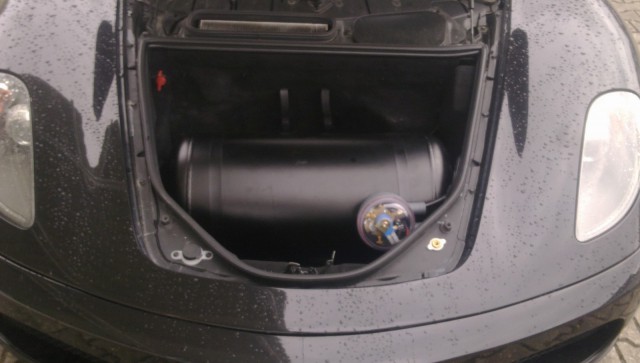Rain Man
Forista
Column: LPG Conversion Kits on Exotic Supercars?

Most supercars offered in the market today come with their ECU tuned for premium gas fuels say 93 octane rated or higher, but as we all know, LPG fuel is much cheaper and in that regard, several sports cars owners would like to drive their expensive cars on a daily basis but the fuel prices for the premium gas proves to be a challenge.
The basic assumption posed by most people is that a Ferrari owner has enough money to pay for his fuel, premium insurance and other costs, but sometimes this is not always the case. As you can see from these photos, this is a Ferrari F430 with an LPG conversion kit. Strange isn’t it? But I don’t think so and I will explain why. Over time, owners of Ferrari 348′s and 355′s have been known to fit in this LPG conversion kits in their cars for two main reasons. The first is due to the high prices of premium gas, which at times is not available in all countries. The second is to reduce the import taxes, cars on LPG have lower import taxes than those on premium gasoline, LPG is considered as a greener by-product.

So basically those doing it fit a storage tank in the boot where the entire kit shall feed from, the vaporizer is the variant here since it should match the fuel requirements of the engine, also the mixing plates should fit the engine. The rest of the equipment includes such things as the fuel tank, LPG shut off, Gasoline shit off, filler system, fuel tank frame, dash switch, the fuel lines and electric wires and of course the vaporizer and the mixing plates. All that for a non-LPi engine.
Depending on which country one comes from, rules may vary as to the installation strategies such as the location of the tank, location of the filler system etc.
The big question still remains, is it safe to have these conversions? Well, as per the many opinions given by those who have done it, we can’t come to a clear conclusion but thanks to science for we know one thing for sure, water never mixes with gasoline. Since it is heavier, instead, it collects around the lowest point where it can freeze forming blockages in the fuel lines, filters and even injectors. This will only lead to higher maintenance costs while you thought you escaped the fuel cost. Alcohol on the other hand will comfortably mix with water.

Of course, this is just my own opinion and borrowing chunks of the little science I learnt in high school back in the early days, feel free to throw in your own opinion at the chat box below!

Most supercars offered in the market today come with their ECU tuned for premium gas fuels say 93 octane rated or higher, but as we all know, LPG fuel is much cheaper and in that regard, several sports cars owners would like to drive their expensive cars on a daily basis but the fuel prices for the premium gas proves to be a challenge.
The basic assumption posed by most people is that a Ferrari owner has enough money to pay for his fuel, premium insurance and other costs, but sometimes this is not always the case. As you can see from these photos, this is a Ferrari F430 with an LPG conversion kit. Strange isn’t it? But I don’t think so and I will explain why. Over time, owners of Ferrari 348′s and 355′s have been known to fit in this LPG conversion kits in their cars for two main reasons. The first is due to the high prices of premium gas, which at times is not available in all countries. The second is to reduce the import taxes, cars on LPG have lower import taxes than those on premium gasoline, LPG is considered as a greener by-product.

So basically those doing it fit a storage tank in the boot where the entire kit shall feed from, the vaporizer is the variant here since it should match the fuel requirements of the engine, also the mixing plates should fit the engine. The rest of the equipment includes such things as the fuel tank, LPG shut off, Gasoline shit off, filler system, fuel tank frame, dash switch, the fuel lines and electric wires and of course the vaporizer and the mixing plates. All that for a non-LPi engine.
Depending on which country one comes from, rules may vary as to the installation strategies such as the location of the tank, location of the filler system etc.
The big question still remains, is it safe to have these conversions? Well, as per the many opinions given by those who have done it, we can’t come to a clear conclusion but thanks to science for we know one thing for sure, water never mixes with gasoline. Since it is heavier, instead, it collects around the lowest point where it can freeze forming blockages in the fuel lines, filters and even injectors. This will only lead to higher maintenance costs while you thought you escaped the fuel cost. Alcohol on the other hand will comfortably mix with water.

Of course, this is just my own opinion and borrowing chunks of the little science I learnt in high school back in the early days, feel free to throw in your own opinion at the chat box below!



